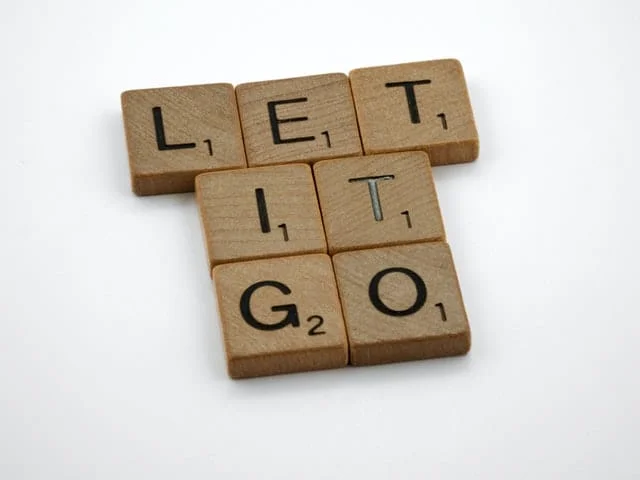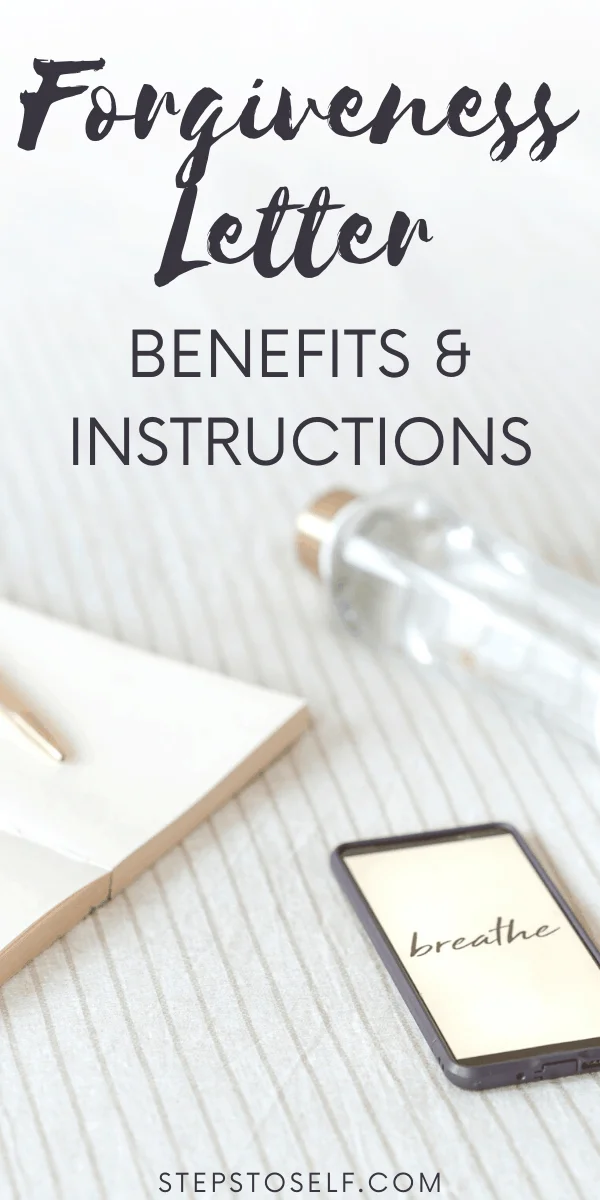Being able to forgive can improve your own mental and physical health. As good as this sounds, it doesn’t mean forgiveness is easy.
Most of us are painfully aware of how difficult it can be to forgive someone who has wronged us. Forgiveness takes strength and practice.
Writing a forgiveness letter is one method you can use to help carry out the act of forgiveness. In this article, we’ll review some science behind forgiveness, then get into specifics about how to use forgiveness letters to soothe your mind, body, and soul.

Tips are based on personal experience and should not be considered medical advice.
What Is Forgiveness?
Forgiveness isn’t as simple a concept as it might seem. According to experts, forgiveness involves both an emotional and a behavioral component.
This means you have the emotional “letting go” along with an external act, such as telling the person that you forgive them. For example, saying “I forgive you” alone isn’t enough. There has to be a real change on the inside.
There’s another thing: true forgiveness is said to go beyond the act of simply moving past a transgression. It goes a step further and involves bestowing something positive on the offender, such as compassion, empathy, or understanding.
Wow.
Given its complexities, it’s no surprise that there are many common misconceptions about forgiveness. Before you’re ready to dedicate effort to the act of forgiveness, let’s make sure you understand what it really involves (and doesn’t).
Myths About Forgiveness
- Forgiving someone automatically means you think they shouldn’t be punished
- Forgiveness makes you weak
- Forgiveness means you forget about the offending act
- Forgiveness requires reconciliation (restoring friendly relations) with the offender
Hopefully that clears a few things up.
“Take forgiveness slowly. Don’t blame yourself for being slow. Peace will come.”
Yoko Ono
Benefits of Forgiveness
There have been whole books written about the health benefits of forgiveness. The science is clear: it’s powerful stuff.
Just think about it; until you forgive someone, you’re harboring a festering anger and resentment. Having those feelings bottled up inside creates chronic stress, which is toxic to your body, psychologically and physically. Forgiveness is therefore a powerful method of stress relief.

The many documented benefits of forgiveness include:
- Lowered risk of heart attack
- Improved cholesterol
- Better sleep
- Reduced pain
- Lowered blood pressure
- Improvements in anxiety and depression
- Strengthened immune system
- Improved self-esteem
As many benefits as there are for being forgiving, being unforgiving has as many drawbacks. Harboring negative feelings can keep you from enjoying life and having positive relationships. Plus, it takes its toll on your body.
Some people are naturally more forgiving, but forgiveness can be learned. As many of us have realized, forgiveness takes time. It’s a personal process that involves difficult changes in feelings.
There are various methods that can help a person practice forgiveness. A forgiveness letter is one of them that can be quite therapeutic. I think everyone should try it at least once.
“Hate has caused a lot of problems in this world, but it has not solved one yet.“
Maya Angelou
What Is a Forgiveness Letter?
Writing a forgiveness letter involves a conscious choice to let go of resentment that is weighing you down. You don’t actually need to give your forgiveness letter to anyone. Its purpose is for you to work through your own feelings via the writing process, so it’s not intended for the other person’s benefit.
This way you don’t have to worry about censoring yourself.
You can even write a forgiveness letter to yourself.
Remember, when you haven’t forgiven someone, you’re still carrying around the burden of those negative feelings.
Writing a forgiveness letter may not relieve all your pain from the offense that occurred. The writing process itself may even start out painful as you relive what happened and the feelings around it.
However, completing the full writing process should bring some relief.
How to Write a Forgiveness Letter
This is a task best done by hand with old-fashioned pen and paper, not at the computer. Make sure you’re in an environment where you can be alone with your thoughts and won’t be interrupted during the process.
Before you begin, are you prepared for the emotional journey and ready to open your heart to forgiveness? While you’re going to revisit some difficult feelings, try to set a positive tone for the exercise overall.
Remember, writing the forgiveness letter is about letting go and giving yourself some much-needed release. You should feel as if a weight is being lifted off you and anger and hatred replaced by calm and compassion.
You need to be ready to view the other person with empathy, attempting to understand some of their feelings and motivating factors around the event. Rather than viewing the offender as a monster, try to see them as human with their own unique histories, insecurities, and flaws.
Don’t rush the process. If it’s too much for you to complete in one sitting, come back to it when you’re ready.
It’s not going to be easy, but it will be worth it.
So, are you ready to get started?
“Resentment is like drinking poison and then hoping it will kill your enemies.”
Nelson Mandela
Elements of a Forgiveness Letter
A forgiveness letter can be unique to your needs but generally includes the following elements. I’ve included some example text so you can see how it works. Your letter can be as long or as short as you need it to be.
- Opening: Name the person who you’re forgiving and direct the letter to them
Dear Daniel,
- Describe how you felt leading up to the transgression
Before you cheated on me, I was happy. I thought we were in love. You were my everything.
- Describe your feelings during and after the event. How has the transgression affected you? This is your chance to get some healing by having your hurt acknowledged.
When I found out what you did, it broke my heart into a million pieces. I was so shocked and confused, but it was the betrayal that hurt the most. It felt like everything we’d gone through together was suddenly meaningless, and it left a huge empty hole in my life. I felt like I’d given you so much of myself. For a time, I didn’t know how to move on, how to trust again. The hurt was so deep. I harbored a lot of anger for too long.
- Turn your attention to the offender. What do you think they were feeling around the event and afterwards? Was there anything in their lives that may have been connected? You’re not excusing their behavior but using empathy to acknowledge that no one is perfect.
I hadn’t realized you were unhappy in our relationship. As much as it hurt, looking back, I don’t think you did it out of malice. Maybe it was boredom and the excitement of a new experience. You were tempted by lust and made a bad decision. While it was disappointing the way you chose to end our relationship, you obviously needed someone different. I don’t condone what you did, but we’ve all made mistakes in life.
- Is there anything you can be grateful for, either from the offender or out of the experience?
I’m grateful for the love you showed me for a time. I’m also thankful that I learned I can’t define my worth by what a man sees in me. While it took time, I’ve gained strength in coming through this experience.
- Set your intention for the future. Look to your heart for guidance. What is your wish for yourself and the offender? Show compassion.
With this letter, I am choosing to forgive you. I accept what happened, and I am ready to let go of my resentment. I don’t want to be angry anymore. I release the past and its power over me. I want to be able to open my heart to love again. I hope you find happiness.
- Closing: Sign your name. Take a deep breath. That was hard work.
With forgiveness,
Samantha

What To Do With Your Forgiveness Letter
As I mentioned, the purpose of writing the letter is for your own benefit, and it’s not intended that you share it with anyone. Some people choose to burn or rip up the letter after they’ve written it as a symbol of letting go of the negative energy.
If you are tempted to give the forgiveness letter to the offender, let it sit for a few days and come back to it to make sure it’s something you really want to do. Ultimately, it’s a personal decision. Be sure to think about whether potentially opening a dialog is going to be helpful.
“Transformation begins in you, wherever you are, whatever has happened, however you are suffering. Transformation is always possible.“
Desmond Tutu
The Power of the Forgiveness Letter
While a forgiveness letter may not be a magical solution to your pain, hopefully it will bring you some amount of relief. You’ve made a big step in deciding to move forward and show compassion to someone who hurt you.
Be proud of yourself for completing the exercise and turning a new page in your life.
If you’re not ready to forgive, that’s OK too. Wanting to forgive someone is a start, and you can come back and revisit your feelings in time.
For more help on your journey to forgiveness, check out The Book of Forgiving: The Fourfold Path for Healing Ourselves and Our World, by Desmond Tutu. His insights on forgiveness are truly inspiring.
Have you tried writing a forgiveness letter? Share your experience in the comments.
Wishing you healing.
